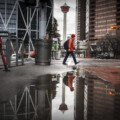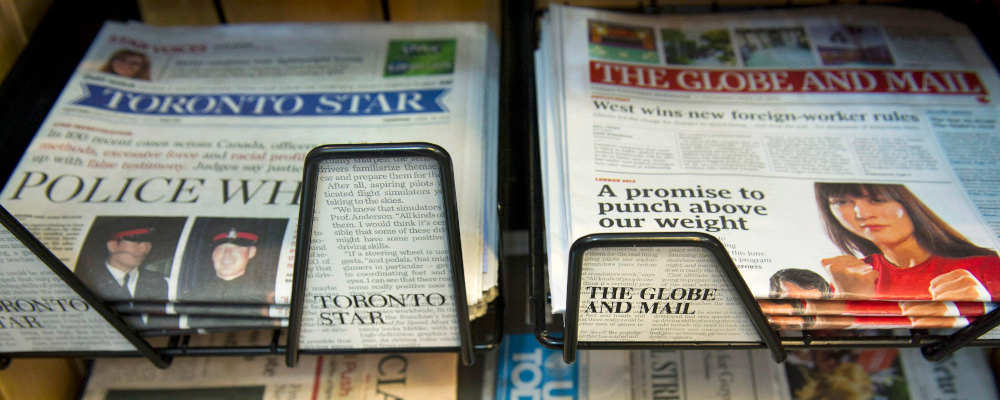The news media in Canada is in crisis. Policy responses to date are failing to solve for the information that citizens need to make informed decisions about important issues and debates. The Future of News series brings together leading practitioners, scholars, and thinkers to imagine new business models, policy responses, and journalistic content that can support a dynamic future for news in Canada.
Legend has it that back in the seventies and eighties when Carleton University journalism students ascended the stage to receive their diplomas on graduation day, the editors of Canada’s top newspapers, magazines, and TV news shows were there sitting in the crowd, silently waiting to tap the shoulders of the young and talented and offer them full-time employment. As a result, some students had media jobs even before they left the auditorium.
Carleton journalism’s class of 2024 will be lucky to get jobs in journalism at all.
Even when I attended Carleton in 2009, the future of Canadian journalism was in question. It felt like professors were giving us hoses to put out an industry in flames. But there was still some promise. Remarks like, “It’s your generation that will have to save the industry”, “People will still read their newspapers, but on iPads”, or “We can just do what the Vice News guys are doing,” echoed through lecture halls. Years later, the Toronto Star’s $40-million dollar Star Touch tablet app experiment would fail catastrophically. Vice Media would file for bankruptcy. Most of my fellow graduates would leave journalism.
Today, much of the Canadian journalism industry has burned to the ground. Last week, even the CBC, which received $1.3 billion from the federal government in 2022, announced it would be eliminating 800 positions. According to Statistics Canada, in 2011 there were 13,280 journalists working in this country. Today there could be as few as 8,000, most of whom have watched in horror as almost $5 billion in revenue has disappeared in about a dozen years.
Journalists today face a public that is far less interested in what we have to say. Reuters and the University of Oxford now report that the number of Canadians who say they are “very or extremely interested in the news” has dropped by more than 20 percent in just six years, now sitting at 43 percent. Shockingly, that’s lower than in the U.S, the U.K., Germany, and Australia. Eight percent fewer Canadians are using the internet to follow the news compared to last year. Nine percent less are turning on their TVs to watch us.
When they do tune in, fewer and fewer trust what they are hearing. In 2018, 58 percent of Canadians said they “trust the news most of the time”. Today, that number is 40 percent. An 18-point drop in five years.
When it comes to confidence, the numbers are even lower. According to Statistics Canada, only 31 percent of Canadians, have “a good or great deal of confidence in Canadian media”. This falls to 14 percent for off-reserve Indigenous people and 23 percent among 25 to 34-year-olds. I say this as an astonished 32-year-old.
An attitude problem
Many journalists will have you believe the blame should be placed at the feet of our readers, viewers, and listeners. You will hear things like, “They need to care about what we do.”
In fact, we may be the only industry that consistently blames the consumer for its ills. As Canadaland publisher and media critic Jesse Brown says, “Most people don’t trust us journalists. In any other business, this would be treated as a problem for the industry to solve…In news, we blame the customer.”
We continue to act like we are holier than thou, that we know best. We tell members of the public we don’t have a job like they do, but “a calling”. We often write with a paternalistic and preachy tone. We nudge people towards thinking a certain way about an issue or have them believe a debate is settled when it is not. We refuse to let audiences draw their own conclusions. We turn news into stories and then into morality tales. We refuse to check our biases before picking up our notepads. We claim the very idea of objectivity is “flawed”. Personal threats from readers are of course unacceptable, but we often adopt a “woe is us” mentality, whining publicly about those who criticize our work. “Accountability…We’re not very good when questioned ourselves”, admitted CBC News editor-in-chief Brodie Fenlon at a recent panel on trust in media. Beyond our cash flow problem, we have an attitude problem that is contributing to our demise.
Out of touch
Part of the problem is that we—the Canadian mainstream media—have lost touch with a great many Canadians who do not see their lives reflected in our work. Many of us journalists had affluent upbringings, are white, university-educated, aren’t religious, and live in large cities (myself included). Many of us work in television newsrooms where the only people who probably voted Conservative in the last decade are those behind the cameras, and perhaps the janitorial staff who clean up after us. We use academic language that is a barrier to entry before readers have even reached a paywall. Our editors bury pitches about controversial debates—but debates that Canadians are already eagerly having around the dinner table. How can we say we have an open dialogue with the Canadian public when major mainstream outlets are disabling comment sections on their content? Even after three decades of the internet, journalism has become a one-way street.
How have some viewers responded? They’ve switched us off.
When Canadians disconnect from the stories we used to collectively engage with national unity suffers. Canadians increasingly feel like they have less of a stake in this country. There are fewer ties that bind this tiny population spread out across the second-largest nation in the world. As The Hub’s editor-at-large Sean Speer noted in a recent column, “In an absence of common stories and shared understandings of ourselves and the country, the danger is that we devolve into a loose collection of individuals merely living in the same geography.”
Hope on the horizon?
All is not lost. Amidst an industry aflame, there are a few phoenixes rising from the ashes. Podcasts, Substack, subscriber fees, and donations from benevolent benefactors have spawned entrepreneurial outlets like The Hub, The Line, Canadaland, Blacklock’s Reporter, The Logic, and The Narwhal. These pioneering media outlets are forming the first faint ruts in the road for others to (hopefully) follow toward more trustworthy and self-sustaining Canadian journalism. Meanwhile, many newspapers stagger forward, propped up by government and Big Tech subsidies.
Newcomer niche outlets come with their own risks. They are confronted by the fact that only 11 percent of Canadians are currently willing to pay for online news. There is also the possibility that as mainstream outlets draw their final breaths, Canadians who still want to be informed will gravitate towards outlets that merely confirm their biases. We could be left with a nation of people trapped in new news bubbles, living in separate realities.

The Hub
I sought the role of managing editor of The Hub because it provides reporting, commentary, and in-depth interviews on politics, business, culture, and foreign affairs not often seen in the Canadian media landscape. Because it wears its patriotism on its sleeve and encourages Canadians to be engaged in their democracy, institutions, and communities. Because The Hub believes this country’s history matters. It deals in big ideas and is open to debate. It is not afraid to wade slowly through policy weeds and wonky waters. It is hiring journalists to produce original content and quickly becoming one of the top most visited independent news sites in Canada. It relies on the insight of genuine experts but also believes in hearing the wisdom of the public. It seeks to understand identity politics, not practice it. It is civil and realistic. It does not purposely feed the anger of Canadians, leaving more division in its wake. As its mission statement reads, The Hub “is a conscious effort to push back against this post-modern malaise.” We want to help shape the conversations that will help make Canada a better country.
Journalism students graduating in 2024 who are gutsy enough to pursue jobs in this industry will face a difficult choice. They can seek work at a legacy media outlet that will provide them with the backing of an institution, long-established journalistic practices, and a familiar name on a business card. And the work can be very rewarding. I should know, I’ve worked for them. But sadly, many of these places are slow to adapt, risk-averse, stuck in bureaucratic mud, and are managing their decline. Their best years are behind them.
Or today’s journalism grads can choose to hitch their wagon to a plucky media start-up. While these outfits may offer less prestige and are still making a name for themselves, they are nimble, they take risks, and they experiment. They are the ones leading the charge into Canadian journalism’s uncertain future. They won’t be resistant to all the flames, but their best is yet to come.
The Future of News series is supported by The Hub’s foundation donors and Meta.
Recommended for You

Sean Speer: Investing in critical minerals isn’t just good business, it’s a national security imperative

‘They’re voting with their eyeballs’: Sean Speer on the revealed preferences of Canadian news consumers

Michael Kaumeyer: Polite decline: Canada’s aversion to being our best is holding us back

Peter Menzies: It’s no wonder Canadians are tuning out the legacy media




